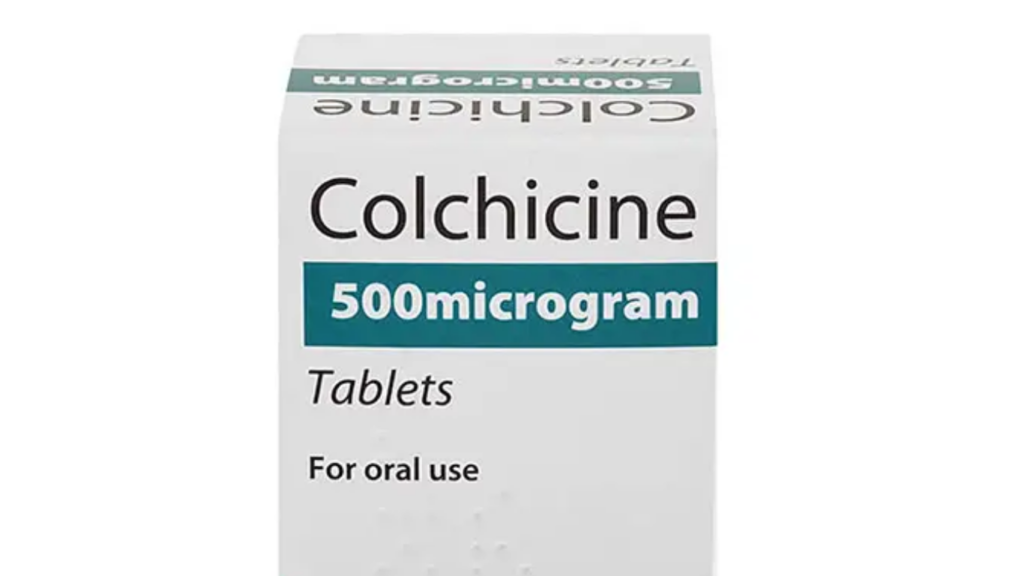Colchicine Anti-Gout: Dosage Side Effects Uses Interactions Warnings Misuse Overdose & More All you need to know
An alkaloid drug from a plant, Colchicine is an anti-inflammatory medication of the Uric acid drugs class used to treat or prevent Gout and Bechet's syndrome.
It is in charge of pericarditis and Familial Mediterranean Fever therapy and works by reducing inflammation via various mechanisms.
Colchicine is consumed through the oral route only and has a slight therapeutic index hence overdosing is a hazard. Gastrointestinal upset is the most familiar side effect particularly, at high doses.
Low blood cells and rhabdomyolysis, are the severe side effects noted and the medication has a reported toxicity. Hence Colchicine should not be used as a routine pain medication.

GENERIC NAME:
Colchicine is traded as a generic drug.
COMMON BRAND NAMES:
The recognized brand names of Colchicine are Colcrys, Mitigare, Gloperba.
HOW DOES COLCHICINE WORK?
It is believed that Colchicine creates disturbance of the inflammasome (multiprotein responsible for the activation of inflammatory responses) complex that is available in both monocytes and neutrophils and functions to activate interleukin-1, an essential mediator of inflammation.
On a molecular level, colchicine can be explained as an anti-mitotic drug, blocking the mitotic action of cells in the metaphase step of the cell cycle.
Colchicine adheres to tubulin, forming complexes that attach to microtubules stopping their elongation.
At scanty doses, colchicine inhibits microtubule growth and, at higher concentrations, colchicine brings about the depolymerization of microtubules.
CLINICAL INDICATIONS AND USES OF COLCHICINE:
Colchicine is recommended for the prevention and therapy of Gout flares. It is also used in Familial Mediterranean fever in adults and youngsters of 4 years of age and above.
This drug is NOT a pain reliever to manage various pain complaints. Painkillers should be advised for this motive.
Some unapproved indications of Colchicine comprise the therapy of the demonstrations of Behcet's syndrome, pericarditis, and postpericardiotomy syndrome.
DOSAGE OF COLCHICINE:
Dose for various conditions:
- Adult Dose for Acute Gout
-Initial: 1.2 mg orally at the early sign of gout flare followed by 0.6 mg 1 hour later
-Maximum dose: 1.8 mg orally over a 1-hour interval; increased doses have not been effective
- Adult Dose for Familial Mediterranean Fever
-Basic dose: 1.2 mg to 2.4 mg orally every day, given in 1 or 2 halved doses
-Dose boosts should be made in increments of 0.3 mg/day as required and accepted to govern illness; if unbearable side effects evolve, the dose should be reduced in increments of 0.3 mg/day
-Maximum dose: 2.4 mg/day
- Adult Dose for Gout – Prophylaxis
-0.6 mg orally one time or twice a day
-Maximum dose: 1.2 mg/day
- Conventional Geriatric Dose for Acute Gout, Familial Mediterranean Fever and Gout- Prophylaxis
-Use care; dose choice should signify increased frequency of reduced renal function, concomitant disease, and/or concomitant medication
Paediatric Dose for Familial Mediterranean Fever
-Age: 4 to 6 years: 0.3 to 1.8 mg orally daily, dispensed in 1 or 2 halved doses
-Age: 6 to 12 years: 0.9 to 1.8 mg orally daily, dispensed in 1 or 2 halved doses
-Age: Older than 12 years: 1.2 to 2.4 mg orally daily, dispensed in 1 or 2 halved doses
-Dose boosts should be made in increments of 0.3 mg/day as desired and accepted to control condition; if unbearable side effects evolve, the dose should be reduced in increments of 0.3 mg/day
-Maximum dose: 2.4 mg/day
- Renal Impairment Dose Adjustments
-Cases with renal suffering should not take colchicine in concurrence with drugs that hinder both P-glycoprotein and Cytochrome P450.
Gout Flares:
-Mild to moderate renal impairment (CrCl 30 to 80 mL/min): Use care; no adjustment advised, but dose deduction may be vital; monitor nearly for unfavourable effects
-Severe renal impairment (CrCl less than 30 mL/min):
-Dose decline should be contemplated
-Treatment course should be repeated no more than one time every 2 weeks
-For sufferers needing repeated courses, an alternate is preferable
Gout Prophylaxis:
Serious renal impairment: Dose deductions or substitutes should be evaluated
Familial Mediterranean Fever (FMF):
-Mild to moderate renal ailment: No drug alteration needed, dose deduction will be helpful and monitoring unwanted effects will be vital.
-Severe renal ailment: Convential dose is 0.3 mg per day; with adequate monitoring for unwanted effects
- Liver Impairment Dose Alterations
-Sufferers of liver ailments should not consume colchicine in conjunction with medications that inhibit both plasma glycoprotein and enzyme Cytochrome P450.
Gout Symptoms:
Mild to moderate liver ailment: No dose adjustment needed. Only monitoring of side effects required.
Severe hepatic impairment:
-No dose adjustment was proposed, but therapy should not be repeated more than once every 2 weeks.
-For patients needing repeated doses, an alternative is preferable
Gout Prophylaxis:
Severe hepatic impairment: Dose deductions or other options should be considered
Familial Mediterranean Fever (FMF):
-Mild to moderate hepatic impairment: Use care, no adjustment advised, but dose deduction may be vital; oversee for unfavourable effects
-Severe hepatic impairment: A dose reduction should be considered
Dose Adjustments
Colchicine Toxicity: Temporary discontinuation or pause will help
-Gastrointestinal tract negative effects (e.g. cramping, nauseousness, diarrhoea, abdominal discomfort, vomiting) usually within 24 hours of starting therapy.
Cytochrome P450 and plasma membrane glycoprotein Inhibitors:
- Should not be used in sufferers of renal or hepatic impairment.
-Cases with normal renal and hepatic function needs colchicine dose alterations only.
Gout Flares:
-0.6 mg orally followed by 0.3 mg an hour later; dose not to be repeated before 3 days with Cytochrome P450 inhibitors.
-1.2 mg orally for single dose; dose to be repeated not before 3 days with moderate Cytochrome P450
-0.6 mg orally for single dose; dose to be repeated not before 3 days with plasma membrane glycoprotein inhibitors.
Familial Mediterranean Fever (FMF):
-Maximum dose allowed: 0.6 mg per day with strong Cytochrome P450 inhibitors
-Maximum dose allowed: 1.2 mg/day with moderate Cytochrome P450 inhibitors
-Maximum dose allowed: 0.6 mg/day with plasma protein glycoprotein inhibitors
ROUTE OF ADMINISTRATION OF COLCHICINE:
It is consumed orally in the form of an oralcapsule, oralsolution or oraltablet, intravenous (IV) colchicine is the treatment for acute gout symptoms.
SIDE EFFECTS OF COLCHICINE:
Commonly reported side effects: diarrhoea and nausea. Following is a detail of adverse effects.
For the Consumer
Appliestocolchicine oralcapsule, oralsolution, oraltablet
Side effects demanding immediate medical care
Though not all of these side effects may happen, if they do arise, they require immediate medical attention.
Morefamiliar
- Diarrhoea
- Sickness
- Stomach discomfort
- Vomiting
Rare
- Black, tarry stools
- Blood in urine or stools
- Burning in the skin
- Problem breathing when exercising
- Fever with or without chills
- Headache
- Hives on the face, eyelids or tongue
- Muscle deformity
- Paralysed fingers or toes
- Peeling of the skin
- Spike red spots on the skin
- Redness of the skin
- Skin inflammation
- Sensitive throat
- Warmth
- Extraordinary bleeding
- Unprecedented tiredness
Incidence unknown
- Bleeding gums
- Chest discomfort
- Cough
- Dark urine
- Headache
- Fever
- Muscle spasms or stiffness
- Muscular pain or exhaustion
- Painful urination
- Pale skin
- The feeling of pins and needles
- Scarring pain
- Swollen or severe glands
- Tightness in the chest
Side effects not requiring immediate medical attention:
These require medical care only if they prolong:
Lesscommon
- Hair fall
- loss of craving
Incidencenotknown
- Stomach bloating
- Stomach cramping
For Healthcare Professionals
Appliestocolchicine: compoundingpowder, intravenoussolution, oralcapsule, oralliquid, oraltablet
General
The most common adverse reactions are
- gastrointestinal symptoms
- pharyngolaryngeal pain
Gastrointestinal
- Diarrhoea
- Abdominal cramping,
- Abdominal pain
- Nausea
- Vomiting
- Lactose intolerance
- gastrointestinal haemorrhage
- Paralytic ileus
- Stomatitis
Hematologic
- Agranulocytosis,
- Thrombocytopenia
- Aplastic anaemia
- Bone marrow suppression
- Disseminated Intravascular Coagulation
Nervous system
- Inflammation of one or more peripheral nerves.
- Nerve damage
Musculoskeletal
- Abnormal muscle cells
- Rhabdomyolysis
- High Creatinine Phosphate Kinase
- Myotonia
- Muscle weakness
- Muscle pain
Hypersensitivity
Renal
- Renal damage
- Bladder spasm
- No passage of urine
- Less output of urine
Hepatic
- Elevated liver enzymes
- Liver damage
Respiratory
- Pharyngolaryngeal discomfort
- Adult respiratory distress syndrome
Ocular
- Delayed corneal wound healing following strabismus surgery
Dermatologic
- Hair loss
- Rashes
- Hives
- Dermatitis/ inflamed skin
Endocrine
Genitourinary
- No sperm
- Low sperm count
- Absence of menstruation
- Painful periods
- Blood in urine
Metabolic
- Loss of hunger
WHEN AND WHERE IS COLCHICINE CONTRAINDICATED?
Contraindications comprise
- gastrointestinalintolerance
- dosing limitations in cases with renal and hepatic dysfunction
- probable drug interactions
INTERACTIONS OF COLCHICINE:
Drugs that affect the removal of colchicine from the body, intensify the risk of serious side effects include certain antifungals (such as itraconazole, ketoconazole), diltiazem, HIV medications (such as ritonavir), macrolide antibiotics (such as clarithromycin, erythromycin), telithromycin, verapamil, among others.
Colchicine may infrequently cause fatal muscle damage which releases substances that can lead to severe kidney issues. The threat may be heightened if any of these drugs are taken: digoxin, gemfibrozil, pravastatin, simvastatin.
This prescription might interfere with specific laboratory tests, perhaps inducing false test findings.
OVERDOSAGE OF COLCHICINE: AN EMERGENCY CRISIS
If any of these symptoms occur while taking colchicine emergency care should be pursued immediately:
- Diarrhoea
- Nauseousness
- Vomiting
- Stomach pain
- Muscle weakness
- Slight or no urinating
- Numbness or tingling
- Weak pulse
- Slow heart rate
- Shallow breathing
- Collapsing
STORAGE:
Stocked at room temperature away from precipitation, warmth and light.



